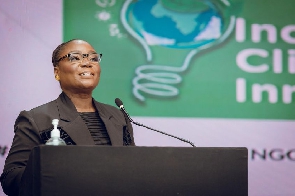The Ghana Climate Innovation Centre (GCIC) successfully organized a one-day symposium on "Building a Resilient Green Economy in Ghana: The Role of Policy, Partnerships, and Finance" at the Movenpick Hotel in Accra.
The event, held on June 15th, aimed to delve into the potential of current financial models, products, and impact investment strategies in Ghana, with the goal of fostering a transition to a robust low-carbon economy. The symposium generated insightful discussions and achieved consensus among participants, outlining key outcomes.
Supported by Global Affairs Canada, the GCIC brought together an esteemed group of speakers and panelists, including representatives from the Canadian High Commission, Ashesi University, African Centre for Economic Transformation, CQ Legal & Consulting, World Bank, Bank of Ghana, Deloitte Ghana, Ghana Forestry Commission, Standard Chartered Bank Ghana, Injaro Investments, Ghana Investment Promotion Centre, Ghana Venture Capital Trust Fund, CAL Bank, and MANA Mobility.
Key insights were shared during the symposium, with Ruka Sanusi, the Executive Director of GCIC highlighting the importance of addressing underlying issues of livelihood, jobs, and businesses to achieve the AU agenda 2063, execute the dream of the African Continental Free Trade Area (AFTCA), tackle the climate emergency, and resolve conflicts on the continent. The need for innovative approaches in policy-making and financial institutions to adapt to new market conditions and changing global needs was also emphasized.
The symposium further stressed the significance of locally driven solutions to address societal challenges. Developing a green economy not only enhances the resilience of the population but also creates employment opportunities and sustainable livelihoods for households, contributing to long-term prosperity.
Professor Asafu-Adjaye, Senior Fellow and Head of Research at the African Center for Economic Transformation (ACET) accentuated the importance of adopting climate-smart practices, emphasizing that sustainable and broad-based growth requires diversifying exports and production, enhancing competitiveness, improving productivity across sectors, promoting technology and innovation, and enhancing human well-being.
Speakers and panelists highlighted the role of sustainable finance as an effective tool and enabler in transitioning to systems, policies, and investments that minimize environmental destruction and safeguard the world for future generations. They emphasized the need for sustainable financing frameworks and regulatory focus on sustainability to position Ghana as a leader in Africa's path towards more sustainable investments.
During panel discussions, participants emphasized the role of financial stability in formulating impactful policies to address the urgent challenges of climate change. They called for the active utilization of policy and financial instruments to drive tangible actions and ignite transformative change, stressing the importance of effective implementation and enforcement of legislation.
The symposium concluded with a shared commitment to raising awareness among investors, encouraging them to explore novel opportunities and invest in uncharted territories. Participants acknowledged the urgency of time in combating climate change and emphasized the need for swift action, adaptation, and continuous innovation to ensure the effectiveness and relevance of solutions.
Below are some key recommendations that came out of the symposium:
• Policy should be a driving force in promoting the adoption of sustainable finance.
• Financial institutions should prioritize environmental and societal value alongside profit maximization.
• Enhancing affordable energy through renewable sources is vital for accelerating the transition to a low-carbon economy.
• Implementing the D.E.P.T.H. approach: Promoting diversified exports and production; Enhancing export competitiveness;
• Stimulating productivity growth across all sectors;
• Encouraging technology and innovation;
• Improving human wellbeing.
• Policies play a pivotal role in shaping and restructuring the green economy. As we navigate the challenges of climate change, it becomes increasingly evident that transformative policies are indispensable for achieving sustainability objectives. By deliberately designing and implementing policy frameworks that prioritize environmental protection, renewable energy, and resource efficiency, we can foster the growth of a resilient and thriving green economy.
Press Releases of Monday, 3 July 2023
Source: Ghana Climate Innovation Centre













